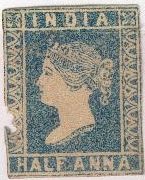
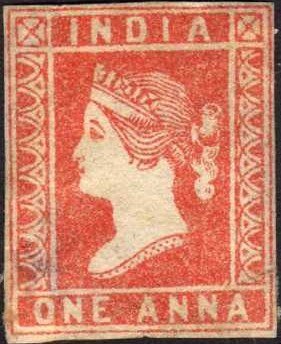

Return To Catalogue - India overview - India 1854 issue, 4 Annas forgeries - India 1855-1865
Note: on my website many of the
pictures can not be seen! They are of course present in the cd's;
contact me if you want to purchase them: evert@klaseboer.com.
The first stamps to be issued in India, were those of Scinde (see there for examples) in 1852.
1/2 a blue 1 a red 2 a green

Unissued '9 1/2 arches' design 1/2 a red.
Captain Thuillier was asked to make new designs after the 'lion and palm' essays were rejected. He designed 1/2 a, 1 a, 4 a and 8 a. The 8 a was never issued and a 2 a was added instead. A 1/2 a in red (vermillion) was prepared, but never issued, due to the fact that the chemically agressive ink destroyed the printing stones (see for example http://www.hindu.com/yw/2004/10/09/stories/2004100900200100.htm)
Value of the stamps |
|||
vc = very common c = common * = not so common ** = uncommon |
*** = very uncommon R = rare RR = very rare RRR = extremely rare |
||
| Value | Unused | Used | Remarks |
| 1/2 a red | RRR | - | Prepared, but not issued; printed in sheets of 120 stamps. |
| 1/2 a blue | RR | R | Issued 1st October 1854. Printed in sheet of 96 stamps (12 x 8). |
| 1 a red | RR | RR | |
| 2 a green | RR | RR | |
The stamps have a sheet watermark consisting of the arms of
the East India Company. Reprints do not have any watermark.
Three dies exists for the 1/2 a blue stamp, also several plates
were retouched. Also three dies exists for the 1 a stamp. The
printing plates of the 1 a were also retouched in several places.
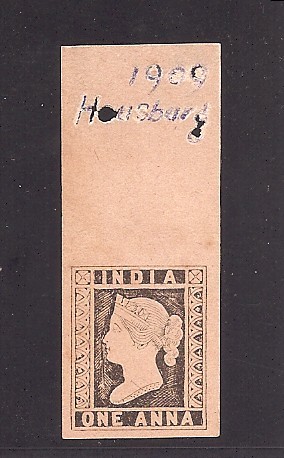
Hausburg reprint in black of the 1 a
stamp from 1909.

Spence reprint with letters "S", "P",
"E", "N" and "C" printed on the
back.
Rates:
1/2 a: inland letters up to 1/4 Tola
1 a: inland letters up to 1/2 Tola
2 a: inland letters up to 1 Tola
4 a: foreign letters, minimum rate for letters up to 1/4 ounce
from India to Great Britain.
According to Spence, there are 55 proofs, essays and reprints known of the 1/2 a stamp and 25 of the 1 a stamp. 87 different reprints, essays and proofs also exist of the 2 a green (issued from 1854 to 1916, according to Spence).
In the 1/2 a red, there should be 9 1/2 triangles at the left and right borders of the stamp, the following stamp is a forgery (it has only 8 triangles). The blue stamp besides it is obviously from the same forger (the genuine 1/2 a blue does have 8 triangles by the way):
Other forgeries:
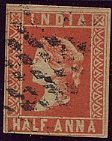
(Other forgery, reduced size)
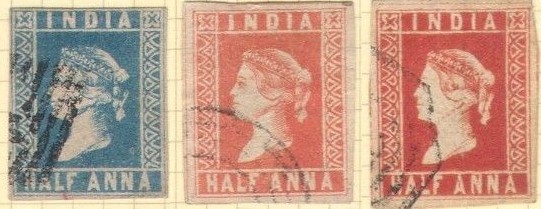
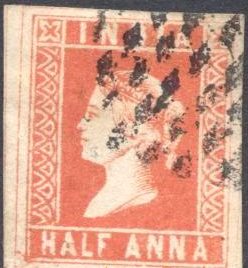
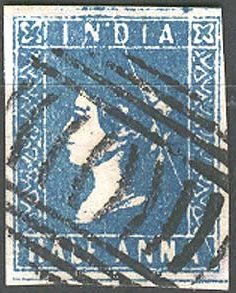
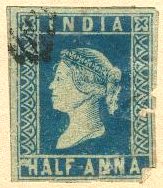

Could this be a products of Spiro? These
forgeries have a very large 'chin' and the 'H' of 'HALF' is
placed too far to the left.
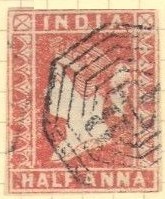
I've been told that this is a reprint of the 1/2 a, with the
upper corners as the 1 a value. It has a forged cancel.
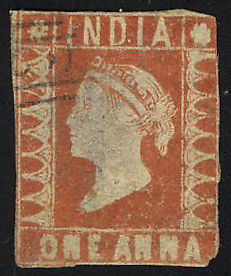
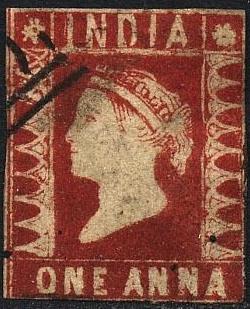
I think this is the second forgery of the 1 a stamp described in
Album Weeds. It has two flowers in the upper corners and the word
"INDIA" very tall. The ornaments at the side are also
different.
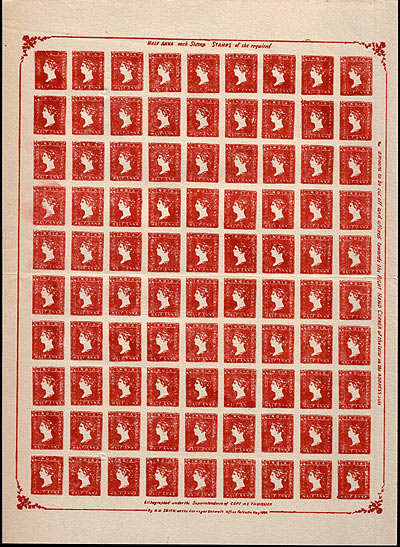
Whole sheet of 1/2 a red forgeries
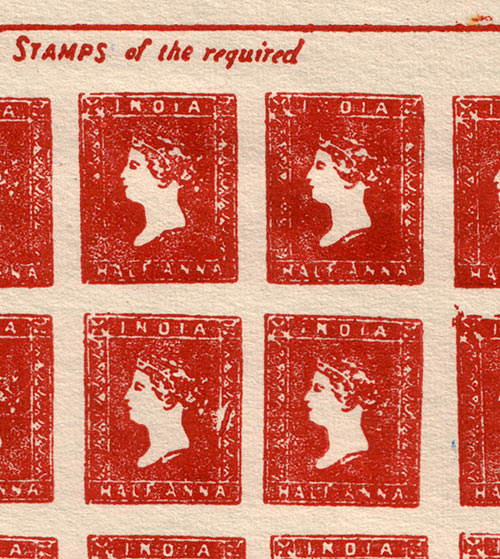
Zoom in of the above sheet
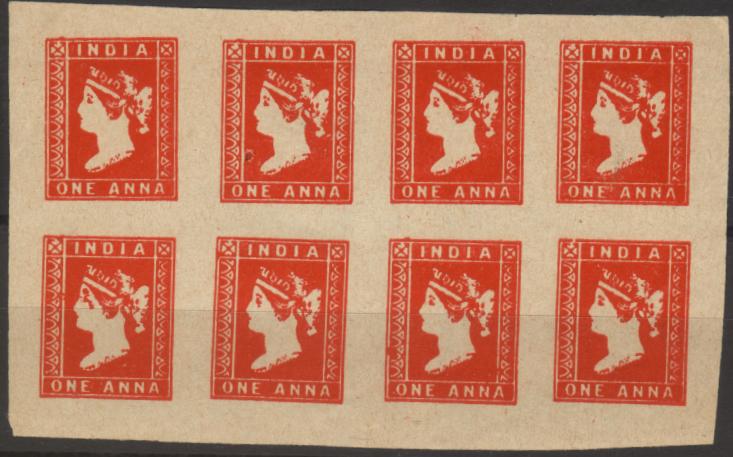
Block of 8 forged 1 a stamps.
Other forgeries of the 1/2 a and 1 a in various colours, probably made by the same forger (note the expression of the face):


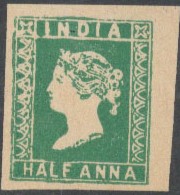
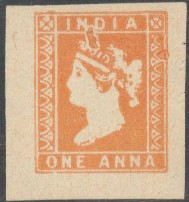
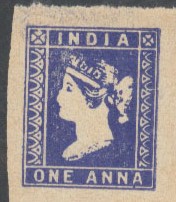
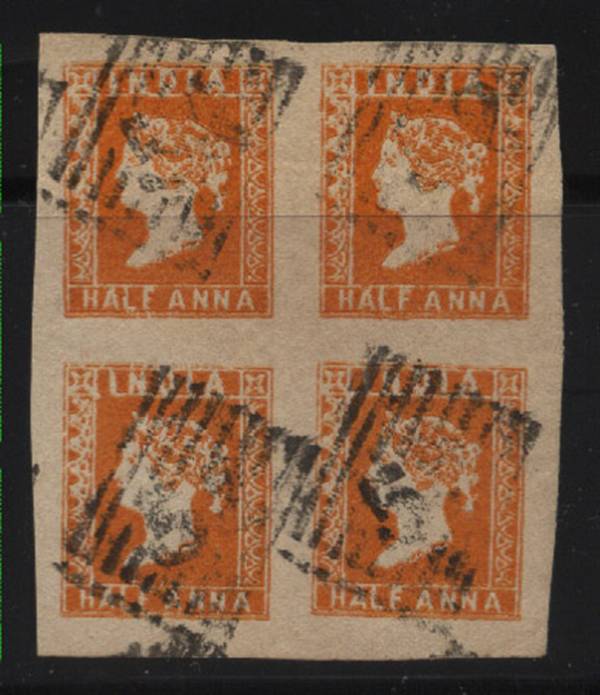
The same forgeries in a block of four with '52' numeral cancel
It seems that the Moens made some unauthorized reprints of the 1/2 a and 2 a stamps in several bogus colours (black on blue, black on red etc.).

I've been told that these are reprints made in 1889, however the
design does not resemble the genuine stamps. They have
'Specimen.' written at the back.

Block of four highly suspect 1 a stamps with a '124' cancel,
probably forgeries
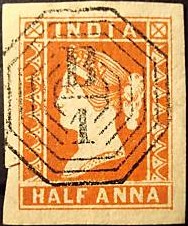
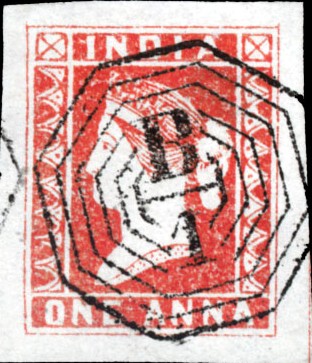
Forgery of the non-issued 1/2 a red stamp. The genuine stamp has
a flower pattern in the upper corners, this forgery has crosses.
There are 8 arches at the sides of this forgery, while the
genuine stamp has 9 1/2 arches. The 'H' of 'HALF' is placed too
far to the left when compared to a genuine stamp. This forgery
(always?) has a 'B1' numeral cancel. Next to it a forgery of the
1 a red stamp made by the same forger.
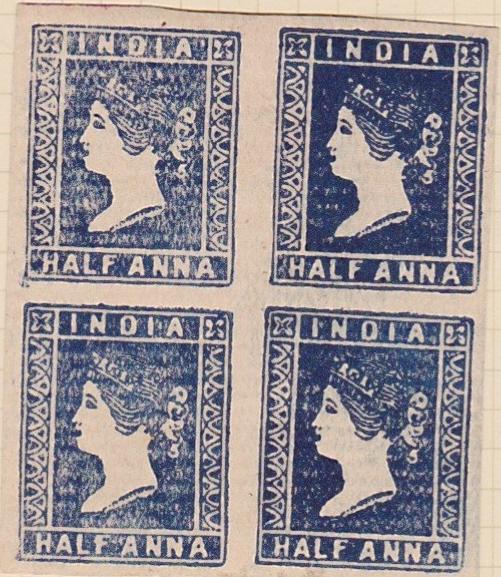

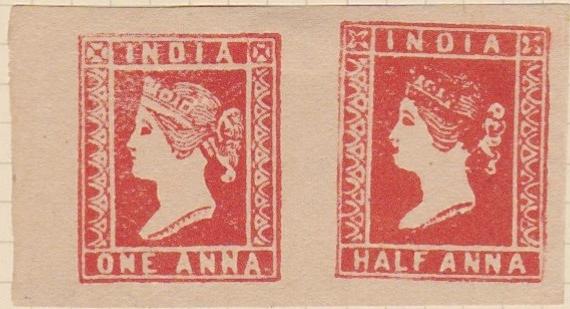
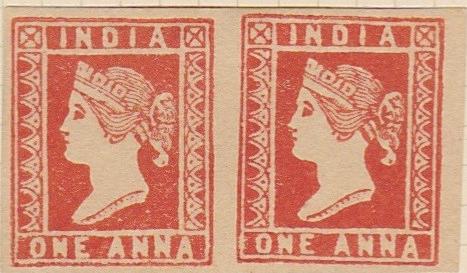
Block of four forgeries, some with 'open mouth'. Next to it some
forgeries made by the same forger. Also a 1 a (with closed mouth)
and a 1/2 a (with open mouth) printed together.
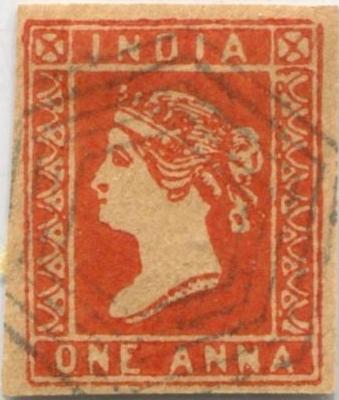
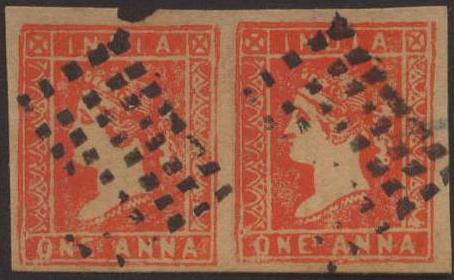

Forgery with very pronounced eye and nostril.

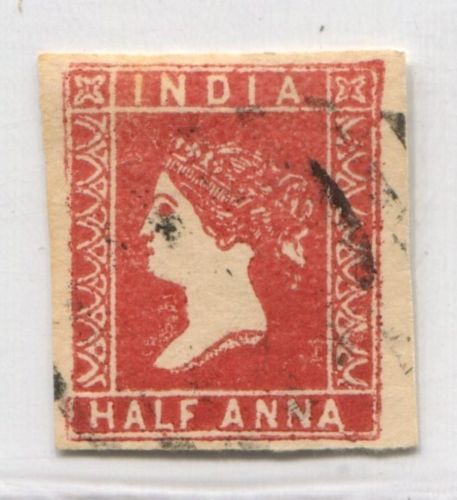
This forgery of the 1/2 a has the "H" much broader.
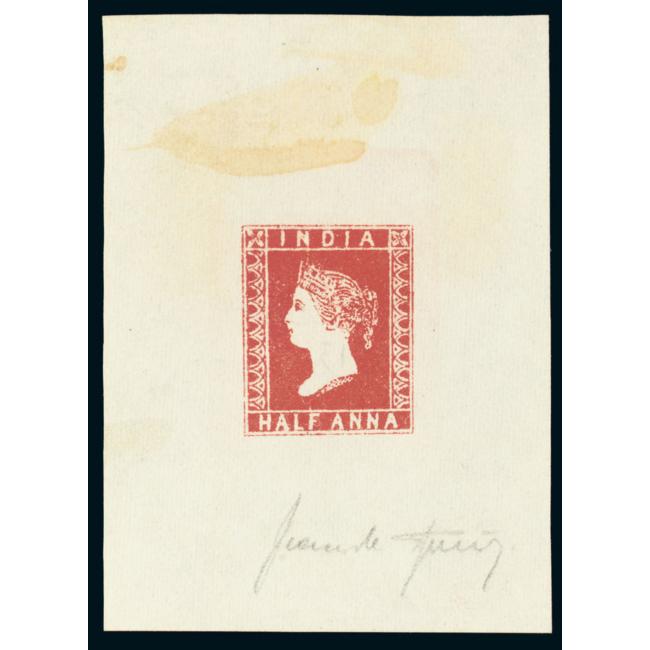
A Sperati forgery of the 9 1/2 arches
unissued stamp. There is a small white line above the 'F' of
'HALF' in this forgery.
The forger Treherne made forgeries of the 1/2 a and 1 a values of this issue (source: "Philatelic Forgers, their Lives and Works" by V.E.Tyler).
4 a red and blue
Value of the stamps |
|||
vc = very common c = common * = not so common ** = uncommon |
*** = very uncommon R = rare RR = very rare RRR = extremely rare |
||
| Value | Unused | Used | Remarks |
| 4 a | RR | R | With full margins: RR With inverted center (about 30 stamps known to have survived): RRR |
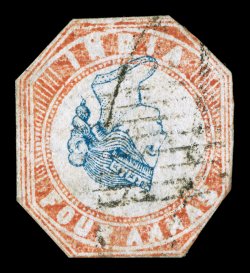
Inverted head varitiety, stamp originally belonging to the Ferrari collection. Only 27 genuine
inverted head stamps are known to exist.
This stamp was the first bi-colored stamp in the world. Most
stamps (around 90 %) are cut to shape. The first printing of
these stamps were printed with blue wavy separation lines; the
stamps were placed at a 18 mm distance. The second printing did
not have any separation lines and was printed at a 6 1/2 mm
distance. The third printing also did not have any separation
lines and was printed at a distance of 2 1/2 mm. Specialists
distinguish between the impression of the head of the first
printing (coarser printed head) and the 2nd/3rd printing (finer
printed head). The stamps have a sheet watermark consisting of
the arms of the East India Company.
Reprints exists and were first made in 1867 with
red or blue separation lines without watermark. Other repritns
exist from 1887(?).
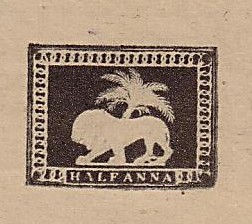
Some essays were made in a totally different design: a lion with a palm tree behind it. Besides the above 1/2 a black, I have also seen 1/2 a blue and 1/2 a red. They were designed by Colonel Forbes.
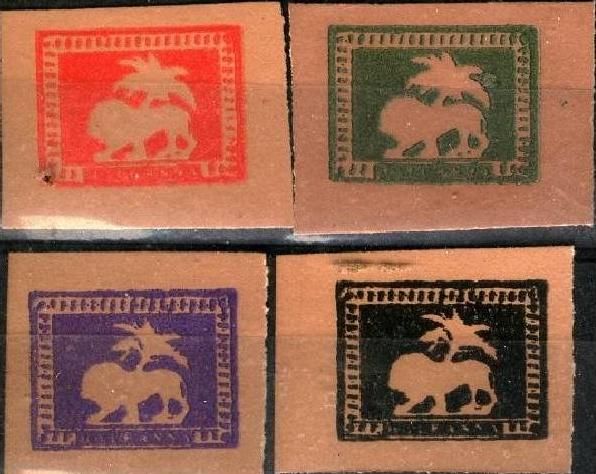
Forgeries of these essays.
In 1854 some other essays were made depicting the Queen with a gothic crown (as the 5 Sh coins).
Websites:
http://www.hindu.com/yw/2004/10/09/stories/2004100900200100.htm
Reprints, literature: 'The identification of the Essays, Proofs & Reprints of the 1854 issue of India' by James A. Spence (1975).
For stamps of India issued from 1855 onwards click here.